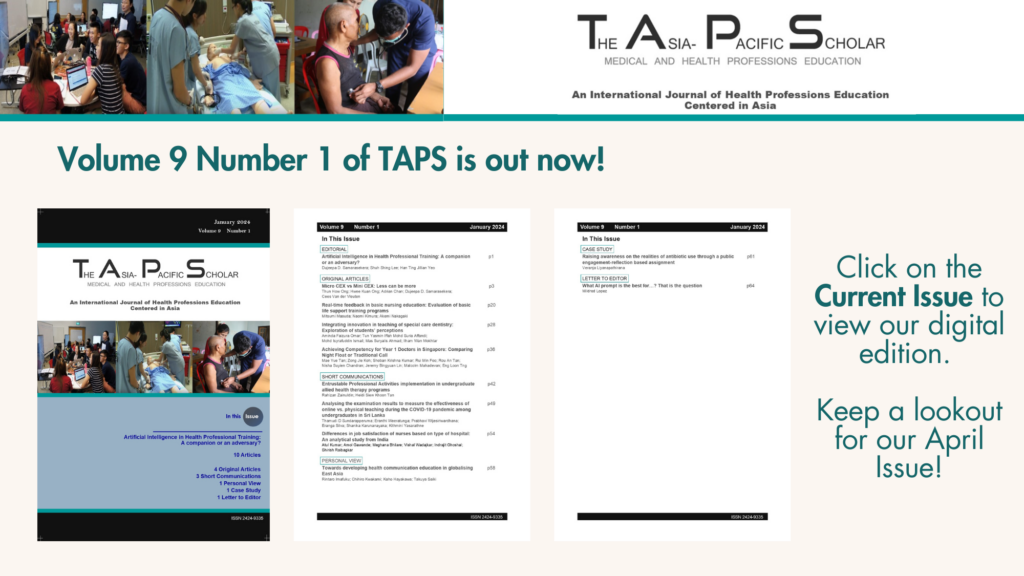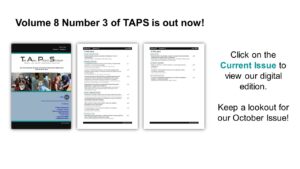Report of the 12th ASEAN Medical Deans’ Summit (AMDS)
Submitted: 6 May 2024
Accepted: 28 August 2024
Published online: 1 October, TAPS 2024, SP01, 22-24
https://doi.org/10.29060/TAPS.2024-SP01/SP008
Jamuna Vadivelu1, Wei-Han Hong1 & April Camilla Roslani2
1Medical Education & Research Development Unit (MERDU), Faculty of Medicine, Universiti Malaya, Malaysia; 2Department of Surgery, Faculty of Medicine, Universiti Malaya, Malaysia
I. INTRODUCTION
The ASEAN Medical Schools Network (AMSN) was established in 2012 with the aims of promoting friendship and collaboration among the leading medical schools in ASEAN. In line with the ASEAN Vision 2020, we work as one community, sharing resources and building capacity to achieve excellence in medical education and healthcare. The 12th ASEAN Medical Deans’ Summit (AMDS), held from 28-29 July 2023 in Kuala Lumpur, Malaysia, focused on capacity building initiatives for an ASEAN healthcare workforce that can work across borders, facilitating mobility of healthcare professionals who are trained to adapt to local cultural practices and sensitivities.
Internationalisation of higher education across regions is a multidimensional process. To promote the development of a regional integrated higher education space, the 12th AMDS was delivered in the Faculty of Medicine, Universiti Malaya, as a two-day programme over three sessions and a workshop, with each school sharing their best practices regarding preparation of practice-ready graduates, assessments and learner-centred coaching.
II. ACTIVITIES DURING THE 12TH AMDS
A diverse group of medical educators presented current initiatives at their respective schools in Sessions 1, 2 and 3. They were then asked to define strategies for multicentre collaboration to advance the current state of preparing future-ready healthcare professionals who can work across ASEAN through medical education initiatives by harnessing the power of collective expertise.
Session 1, moderated by AMSN President, Professor Charlotte Chiong (Philippines), addressed the preparation of graduates who are ready for practice. Professor Yang Faridah Abdul Aziz (Malaysia) focused on the shift to competence-based education in Malaysia, while Adjunct Professor Lau Tang Ching (Singapore) shared on how developing common curricula for healthcare adjacent fields could facilitate interprofessional education. The design and implementation of competence-based medical curricula was further developed by Professor Nguyen Huu Tu (Vietnam), while the experience of Faculty of Medicine Siriraj Hospital in non-compensatory evaluation & Pi-shape education was shared by Associate Professor Tripop Lertbynnaphong (Thailand).
Session 2 focused on teaching, mentoring and coaching in medical education, moderated by Associate Professor Marion Aw (Singapore). The need to refine the roles of trainers in postgraduate clinical programmes was presented by Professor Shahrul Bahyah (Malaysia), further illustrated by the PGH experience of supporting medical trainees during the pandemic shared by Associate Professor Dionne Sacdalan (Philippines). Presentations on the importance of coaching in a learner-centered approach, by Professor Dwiana Ocviyanti (Indonesia), and the transformative impact of problem-based learning by Professor Khin Aung Htun (Yangon), rounded off the session.
Assistant Professor Kanokwaroon Watananirun (Thailand) moderated Session 3, on best practices in assessments. While Professor Christina Tan (Malaysia) tackled the thorny issue of hawks and doves impacting assessments, Dr Nurhanis Syazni Roslan (Malaysia) showed how standard setting in high-stakes assessments provided evidence of validity. The theme was further developed by Dr Dujeepa Samarasekera (Singapore) who spoke on performance-based assessments, while assessment implementation of interprofessional health education across the Faculties of Medicine, Public Health, and Nursing were described by Assoc Prof Ahmad Hamim Sadewa (Indonesia).
In Session 4, the workshop on harmonisation of curricula across ASEAN moderated by Associate Professor Prapat Wanitpongpan (Thailand), participants were divided into four groups to discuss different strategic approaches. The discussion on the ASEAN graduate profile was led by Dr Hong Wei-Han (Malaysia), Professor Ari Fahrial Syam (Indonesia) steered the group on ASEAN Collaborative Learning, the discussant for Diversity, Equity and Inclusion (DEI) was Prof. Bernadette Heizel M. Reyes (Phillipines) while ASEAN Faculty development was chaired by Dr Dujeepa Samarasekera (Singapore). Participants were led through presentations and structured discussions about the challenges of initiatives in future-proofing health care professional who could work across borders with increased mobility and the opportunities offered through international collaboration.
Led by Professor Muhammad Yazid Jalaludin (Malaysia), the AMSN Student Chapter Programme was aimed to encourage networking and leadership, through discussions on current local medical education initiatives and brainstorming on proposed improvements amongst medical students. In preparation for the meeting, the student representatives met online prior to the event and had discussion on Comprehensive Assessment for Future-ready Medical Practitioners. The student representatives from each institution prepared and presented a poster amongst their peers. The students presented on Authentic Assessments, Assessment of Professionalism and Simulation Based Assessment during the Student Dialogue Session, in the presence of the educators. During the summit dinner, students also presented cultural performances and attended the event with all the delegates. The educators and students also had the opportunity to engage with each other through joint academic and social activities such as Faculty of Medicine UM Tour (Centrepoint, Pathology Museum, Anatomy Dissection Hall), Campus Tour which includes Dewan Tunku Canselor and Rimba Ilmu, and KL City Tour around Central Market, Merdeka Square and the Sultan Abdul Samad building.
III. STRATEGIC INITIATIVES
The workshop focused on developing strategies for harmonisation of curricula across ASEAN. All the members present were allocated into four different groups to consider international strategies in future-proofing healthcare professionals for the region. Four strategic initiatives were discussed, which included, creating a generic ASEAN graduate profile, collaborative learning in the region, addressing diversity, equity and inclusion (DEI) and a robust ASEAN Faculty development.
Summarised below are the working group’s recommendations for consideration.
- To use the graduate profile that was developed through consensus in the Tuning Academy – South East project (TA-SE). This meta-profile consisted of common regional competencies (core and subject-specific) for medicine programme in this region. A review of the competencies with potential challenges were discussed with the aim to promote development of common goals in human resource capacity, curriculum development recognition of professional qualifications and academic credentialing within the region.
- To develop a standardised medical curriculum for medical schools within countries in the ASEAN region. Assure that these curricula are comprehensive, but also allow for geographic/regional variability—knowing that analysing the effect of curricula on learners requires some variability and because different courses will have different goals (research, education, clinical, public health, etc.). To foster best practices in development and implementation of these curricula.
- To develop database of ASEAN Experts to formulate an ASEAN Framework for Faculty Development. To review processes, policies, bureaucracies which may restrict mobility and sharing.
- Develop standardised evaluation tools that could give rise to large-scale qualitative and quantitative data sets from learners’ global health experiences. Develop multi-institutional, multidisciplinary research networks to compile and share data. Investigate methods to improve coordination of efforts between global health GME programs and research networks to facilitate above recommendations.
IV. CONSENSUS STATEMENT
Recommendations and priority areas for the development of future ready ASEAN health professionals across this region will be based on the outcomes of discussions on the four strategies for the future-proofing of healthcare professionals in the region. A developmental and implementation plan will be designed at future meetings.
Notes on Contributors
JV was responsible for conceptualisation the paper. All authors were responsible for the discussion. JV was responsible for the first draft of the manuscript. HWH and ACR provided their opinions and suggestions. All authors revised the manuscript. All authors read and approved the final version of the manuscript.
Acknowledgement
We would like to acknowledge the organising committee, all speakers, all members of the AMSN and all medical students who have participated actively in the discussion during the AMDS.
Funding
There was no funding allocated for this paper.
Declaration of Interest
The authors declare that they have no competing interests.
*Jamuna Vadivelu
Medical Education & Research Development Unit (MERDU),
Faculty of Medicine, Universiti Malaya
Kuala Lumpur, Malaysia
+603-7967 5739
Email: jamuna@ummc.edu.my
Announcements
- Best Reviewer Awards 2024
TAPS would like to express gratitude and thanks to an extraordinary group of reviewers who are awarded the Best Reviewer Awards for 2024.
Refer here for the list of recipients. - Most Accessed Article 2024
The Most Accessed Article of 2024 goes to Persons with Disabilities (PWD) as patient educators: Effects on medical student attitudes.
Congratulations, Dr Vivien Lee and co-authors! - Best Article Award 2024
The Best Article Award of 2024 goes to Achieving Competency for Year 1 Doctors in Singapore: Comparing Night Float or Traditional Call.
Congratulations, Dr Tan Mae Yue and co-authors! - Fourth Thematic Issue: Call for Submissions
The Asia Pacific Scholar is now calling for submissions for its Fourth Thematic Publication on “Developing a Holistic Healthcare Practitioner for a Sustainable Future”!
The Guest Editors for this Thematic Issue are A/Prof Marcus Henning and Adj A/Prof Mabel Yap. For more information on paper submissions, check out here! - Best Reviewer Awards 2023
TAPS would like to express gratitude and thanks to an extraordinary group of reviewers who are awarded the Best Reviewer Awards for 2023.
Refer here for the list of recipients. - Most Accessed Article 2023
The Most Accessed Article of 2023 goes to Small, sustainable, steps to success as a scholar in Health Professions Education – Micro (macro and meta) matters.
Congratulations, A/Prof Goh Poh-Sun & Dr Elisabeth Schlegel! - Best Article Award 2023
The Best Article Award of 2023 goes to Increasing the value of Community-Based Education through Interprofessional Education.
Congratulations, Dr Tri Nur Kristina and co-authors! - Volume 9 Number 1 of TAPS is out now! Click on the Current Issue to view our digital edition.

- Best Reviewer Awards 2022
TAPS would like to express gratitude and thanks to an extraordinary group of reviewers who are awarded the Best Reviewer Awards for 2022.
Refer here for the list of recipients. - Most Accessed Article 2022
The Most Accessed Article of 2022 goes to An urgent need to teach complexity science to health science students.
Congratulations, Dr Bhuvan KC and Dr Ravi Shankar. - Best Article Award 2022
The Best Article Award of 2022 goes to From clinician to educator: A scoping review of professional identity and the influence of impostor phenomenon.
Congratulations, Ms Freeman and co-authors. - Volume 8 Number 3 of TAPS is out now! Click on the Current Issue to view our digital edition.

- Best Reviewer Awards 2021
TAPS would like to express gratitude and thanks to an extraordinary group of reviewers who are awarded the Best Reviewer Awards for 2021.
Refer here for the list of recipients. - Most Accessed Article 2021
The Most Accessed Article of 2021 goes to Professional identity formation-oriented mentoring technique as a method to improve self-regulated learning: A mixed-method study.
Congratulations, Assoc/Prof Matsuyama and co-authors. - Best Reviewer Awards 2020
TAPS would like to express gratitude and thanks to an extraordinary group of reviewers who are awarded the Best Reviewer Awards for 2020.
Refer here for the list of recipients. - Most Accessed Article 2020
The Most Accessed Article of 2020 goes to Inter-related issues that impact motivation in biomedical sciences graduate education. Congratulations, Dr Chen Zhi Xiong and co-authors.









